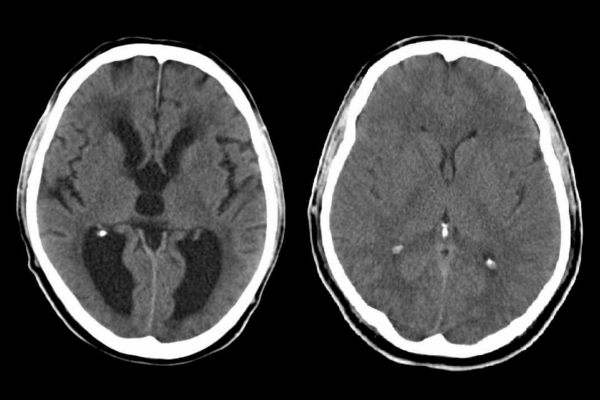Normal pressure hydrocephalus ( also known as NPH or Hakim's disease), or a buildup of fluids surrounding the brain, is characterized by gait disturbance, incontinence and/or memory deficits. This disease is complicated to determine, and it often misdiagnosed Often it as Alzheimer's or Parkinson's disease, or as general atrophy of the brain. Imaging of the brain shows enlarged brain chambers (ventricles).

Left: a brain affected by hydrocephalus. Right: a healthy brain.
Today, treatment is very effective and keeps patients mobile, increasing their quality of life.
Normal pressure hydrocephalus is a disease of elderly people. An estimate 5% of people older than 65 years suffer from the disease, which means that almost everybody knows someone with normal pressure hydrocephalus.
The first step: The right diagnosis
In early stages, the diagnosis is not easy: mild gait disturbances are usually only detected by the patient, so by the time it is observable by others, it has already deteriorated. The disease is progressive and, if not treated, can result in premature nursing needs or death. Therefore, an accurate and early diagnosis is essential to maintain the quality of life.
Diagnosis is completed by evaluating the patient history, performing a neurological examination, high resolution imaging (MRI) and a spinal tap test, where brain water (cerebrospinal fluid) is drained via a lumbar puncture in the lower back.Treatment of Normal Pressure Hydrocephalus
Our neurosurgical department specializes in the diagnosis and treatment of normal pressure hydrocephalus.
During the first visit, attention is focused on informing the patient and their relatives about the natural course of the disease and what the treatment (or lack of it) could mean for the future.
Medical care and treatments may include:
- General information of the disease and its effects to daily life
- High expertise in diagnostic tools and differential diagnosis
- Clarifying the diagnosis and showing the recovering potential by a spinal and/or brain fluid tap test
- Individually tailored surgical approach (endoscopy or hydrocephalus shunt with hydrostatic programmable valves)
- Follow-up of shunt systems with eventual reprogramming of the valve
- Regular visits and discussions with the inclusion of family members
Please contact Premier Healthcare to discuss treatment opportunities in Germany for hydrocephalus and other neurological conditions.
